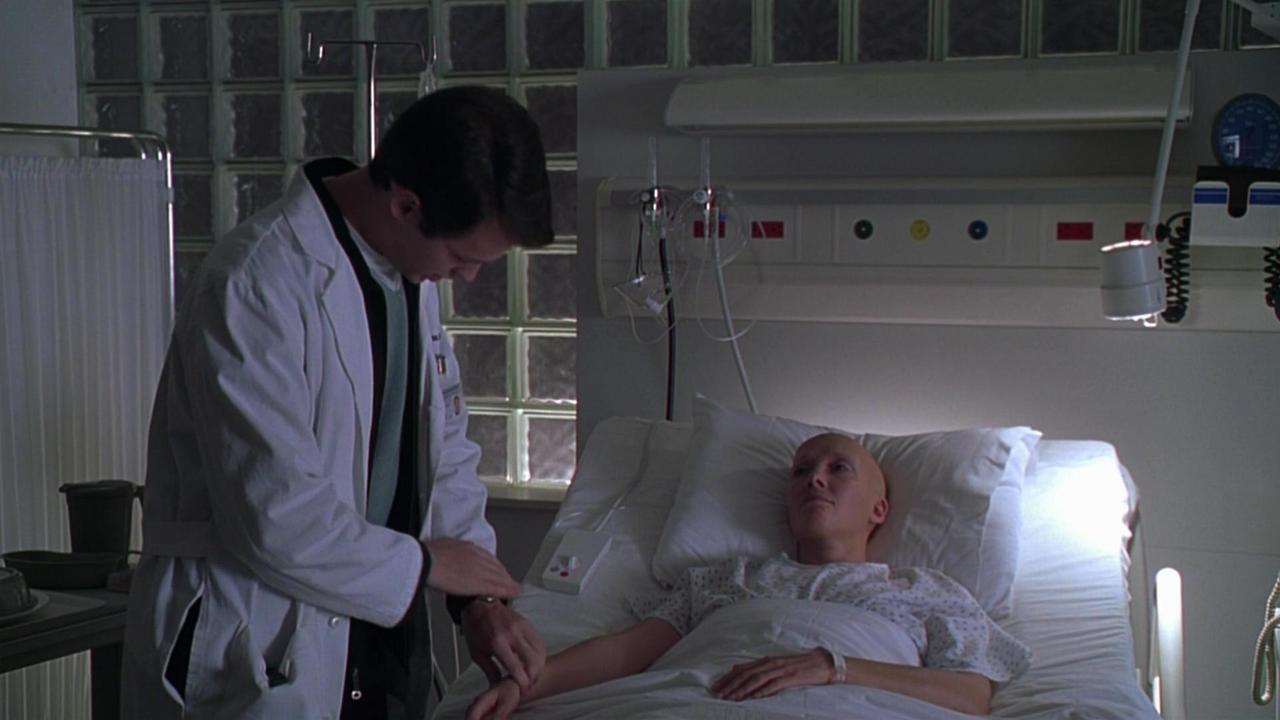

Stylish but barely mediocre overall
... View MorePerfect cast and a good story
... View MoreOne of the most extraordinary films you will see this year. Take that as you want.
... View MoreThe film's masterful storytelling did its job. The message was clear. No need to overdo.
... View More(Spoilers) In the first scene Vivian Bearing (Emma Thompson) is told she has stage IV ovarian cancer. From that point the film traces her experience to the end, in intimate detail. If you are a cancer survivor, or have been through this experience with a loved one, then I would think that this will be too painful to watch. For others this is probably going to be as close to the experience as you will get until it comes to your life.Vivian is a professor specializing in the poetry of John Donne; appropriately Donne's "Death be not proud" poem figures in the movie. One of the things I got from seeing this is how thinking about death, reading great poetry on the subject, listening to philosophers philosophize doesn't really help a whole lot when faced with the ultimate truth. In the final moments Vivian is a scared, lonely person who simply seeks some human kindness. She does not get this kindness from her doctors--no, they are more interested in her as the object of an experiment to see how well she can withstand intense chemotherapy, so that they can write an article about it Vivian speculates. Vivian does get some understanding and kindness from her nurse Susie (Audra McDonald in a fine performance).Vivian is a brilliant, tough woman who most eloquently articulates her experiences, with some wit. The presentation has innovative touches, like placing the ailing Bearing in her classroom teaching in her hospital gown. Some of the most effective scenes have Vivian talking directly to the camera. One scene I found particularly revealing was when Vivian talked about how slowly time moved and said directly to us, "If this were reality, I would just lie here in silence for fifteen minutes while you sat there looking at me." A particularly moving scene had Vivian's adviser, professor Ashford, visit her on her deathbed. When Ashford said to Vivian, "It's a windy day," I was struck by the total gap between those who are still living their daily lives and those who are dying.By her own admission Vivian is a person who wants to know things, so one thing that puzzled me was why she did not ask more questions at the time of her initial diagnosis. Questions like: "What are my options?", "What are the odds in each case?", "What if I do nothing?", "Can you recommend someone to give me a second opinion?" Given the odds, it looks to me like she would have been much better off to have done nothing but wait until the pain was so bad that she could go on morphine. As it was, her treatment made her life a living hell for the time she had left.Thompson gives a spectacularly good performance. I have to believe that this was not an easy role and it took no small amount of courage for her to commit to it.
... View MorePossible Spoiler: Since it is immediately explained, I'm not giving much away in saying that this is a film about an accomplished literary professor who is dying of ovarian cancer. And for the most part, it is just as grim as that summary sounds. But Emma Thompson, just about the only character who matters, is a brilliant actress, beautiful even when completely bald. Mainly, the film is about her coming to terms, slowly and painfully, with her approaching death. The subtext is that with the exception of one nurse (Audra MacDonald) she is treated as little more than an object, an experiment even, by the doctors, including a young resident who took her literature class in college. Although the film depends entirely on Ms. Thompson, who is almost never off-screen, Mike Nichols, who directed and co-wrote the script with Ms. Thompson, deserves credit if for no other reason then for allowing a great actress the freedom to handle an exceptionally difficult, even harrowing, role with a skill that few living actresses could match. The movie is adapted from a Pulitzer Prize winning play by Margaret Mason. Knowing the plot, I would not have chosen to see the movie except for Emma Thompson (and Mike Nichols) but I'm glad I did.
... View MoreBased on the Pulitzer Prize winning play "Wit" (aka "W,t"), it was adapted and rewritten for HBO film by Mike Nichols and Emma Thompson.Prof. Vivian Bearing (Thompson) specializes in John Donne's 17th century metaphysical poetry. (Donne wrote the famous "No man is an island unto himself, Everyman is a part of the continent, a piece of the main..." which I've long loved and understand; but Donne's "Holy Sonnets" are unfamiliar and considerably beyond me;--no matter, this film remains great!.) She's a renowned scholar and popular teacher but yet quite demanding (& without compassion for her students). After Prof. Bearing is diagnosed with terminal ovarian cancer, she agrees to participate in a research trial of a medicinal course. During the movie, she frequently breaks the "fourth wall," often speaking directly to the camera (we, the audience) as she wrestles with the meaning of her life (& death) and her growing awareness of her mortality and the importance of compassion in life. A compelling movie to watch, it's sad (tissues mandatory) but also very uplifting at the end. The background music is excellent and appropriate in both mood and title (it includes Arvo Part's "Spiegle im Spiegle" ("Mirror in Mirror") & Charles Ives "Unanswered Question.") IMDb says this movie is now shown in many medical schools teaching future MDs the importance of compassion. Roger Ebert said Thompson's performance was her best on film. My rating of this Emma Thompson performance: >15+/10.
... View MoreThe movie paints a vivid picture of a hospital where confronting a patient's death is second to experiments.Vivian is an 'experiment' dying alone. I can still recall the relief on the face of my mother when I brought up her imminent death. She was afraid of making ME fearful. I was privileged to share my mother's dying. She shared moments of regret, painful happenings and joyful events. It was one of the best things I have done as a human being.Vivian is clearly relieved to 'know the score' when Susie tells her that medicine will not save her. Susie gives the dying Vivian, medicine of compassion. She touches her and thereby acknowledges her as a human being.Enter the professor who leads Vivian to the moment of death. There is no need for intellectual poetry or sparring. Instead, the professor lies on the death bed holding and supporting her friend. Tears fall from Vivian's eyes, the professor merely confirms the difficulty. The children's story is read and the professor offers her opinion - It is an allegory of a soul. We do not know if Vivian supports this statement. We only know that she dies with the knowledge that she is loved."Out of the mouth of babes," is a scriptural quote that confirms the wit of simplicity. I, personally, needed the bunny story. However, many children's stories have incisive clues to live's mysteries.I am puzzled about the negative comments. Have any of these writers witnessed dying? Why do so many people negate the virtues of kindness, sympathy, touch, love, etc with weakness or by a wave of his/her hand dismiss it as 'boring.' This was not a boring movie. If you saw it this way, you missed the point. Come back, say 10-20 years from now and review it again.
... View More